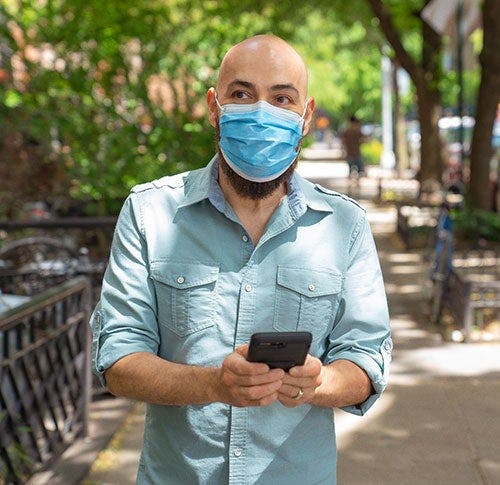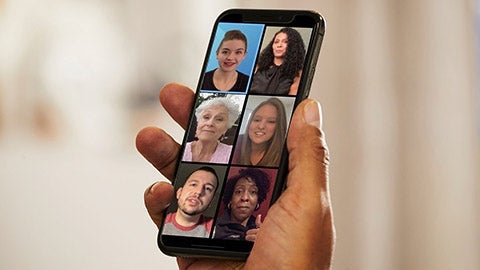Half Of Us Have Gained Weight During The COVID-19 Lockdown | WW UK
COVID-19 & lockdown: weight gain has impacted nearly half the nation
How have our habits changed during lockdown?
To say that lockdown has been tough is quite the understatement.
Since 23rd March, we've had to completely overhaul our lifestyles, working from home and homeschooling the kids while contending with strict limits on everyday life. From curbing the amount of time we spent outdoors to staying away from our loved ones, lockdown and the coronavirus crisis has taken an inevitable toll on our physical and mental health.
As we slowly start to get back to a sense of normality, research commissioned by WW (Weight Watchers) reveals how 93 days of lockdown impacted our wellbeing.
Here are the key findings:



We're eating & drinking more in lockdown
One in two people (48%) said they've eaten more, and one in three (29%) said they drank more alcohol - which could explain why 42% of us claim we've put on weight.

We're less active & more anxious
Nearly one in two people (46%) have been less active since working from home. Our mental health has also taken a hit, with 44% feeling more anxious, and 36% feeling stressed.
Lockdown in 90 seconds
Kickstart your journey to better health with our 12-week weight loss plan
What are the nation's post-lockdown goals?
We may have been living more sedentary lifestyles during lockdown, but change is on the way.
As more shops open on the high street and with lockdown rules beginning to relax, our new priorities are to exercise regularly (46%), lose weight (45%) and improve our wellbeing (37%).
Langcaster-James says: "As the world begins to wake up and get moving, there seems to be a high level of motivation for us all to focus on getting healthy again."
These new priorities could help the 1 in 4 adults (25%) who say they've developed a more negative self-image during lockdown, due to high stress and anxiety coupled with overeating and less physical activity.
Anna Hill, SVP, General Manager at WW UK says: "The past few months have been challenging for everybody, and we’ve had to deal with a lot of stress and a lack of structure in our schedules, which has had a huge impact on the nation’s health and wellbeing.
"We were really concerned about some of the findings of this research. However, we’re reassured to see that many people want to prioritise their health and fitness, especially at a time when it’s more important than ever before. People are reappraising their lives, and are more aware now of what they need to do for themselves to be healthy.
"At WW, our focus has always been to support our members in looking after their health and wellbeing, and we’re committed to helping people stay healthy and well during these challenging times and beyond. We've seen a big demand for our digital app, as it does exactly that - helps people eat well, gets them inspired to be active, helps them stay connected to others for support and guidance.”

COVID-19 and weight: what's the link?
Our collective goal to lose weight as a nation is great news - in more ways than one.
Early research has revealed a possible link between obesity and increased vulnerablity to complications from COVID-19 (coronavirus).
It's still early days in our understanding, but based on emerging data and the patterns of infection researchers have seen in other viral infections, the World Obesity Federation believes that being overweight or obese is likely to be a risk factor for worse outcomes in people infected by COVID-19.
According to the World Health Organization (WHO), chronic disease like heart disease, asthma and diabetes - conditions sometimes related to being overweight or obese - are also risk factors for becoming seriously ill with COVID-19.
Obesity and immune function
There is strong evidence that obesity is associated with a reduced immune function.
A wide range of nutrients has been shown to be essential in healthy immune functioning, particularly vitamins A, C, D, E, B6, B12, folic acid, iron, copper, selenium and zinc.
In order to avoid deficiencies and meet the needs of a healthy immune system, we should aim to include a variety of nutrient-dense foods from a range of food groups in our diets. This can also help us achieve and maintain good health, and reduce the risk of chronic disease throughout all stages of the lifespan.1
Healthy habits are more important than ever
It's easy to feel out of control in the midst of a global pandemic, and when we're forced to rebuild our routines around lockdown restrictions. However, it's important to remember that we can still make our own choices in some aspects of our lives.
For example, we can choose to eat as healthily as we can under the circumstances, be active outside or at home where possible and, importantly, shift our mindsets to think in helpful ways, like focusing on the things we can control.
Healthy habits are more important than ever, and we can help you build them for life.
1. [U.S. Department of Health and Human Services and U.S. Department of Agriculture. 2015 – 2020 Dietary Guidelines for Americans. 8th Edition. December 2015]
Kickstart your journey to better health with our 12-week weight loss plan.
You'll get your first 4 weeks FREE, plus unlock access to 2000+ recipes, easy-to-use trackers and live experiences in the WW app, like cookalongs and virtual city tours.
All figures, unless otherwise stated, are from YouGov Plc. Total sample size was 2210 adults. Fieldwork was undertaken between 9th - 10th June 2020. The survey was carried out online. The figures have been weighted and are representative of all GB adults (aged 18+).
- YouGov is registered with the Information Commissioner
- YouGov is a member of the British Polling Council
